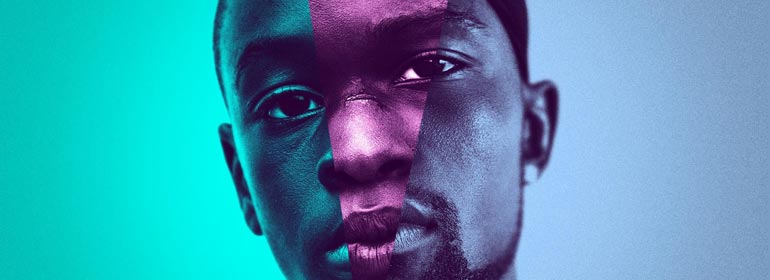Some gay critics may claim that Barry Jenkins’ Oscar nominated ‘Moonlight’ is a bit ‘straight eye on the gay guy’, but Brian Finnegan thinks the film transcends the usual queer coming-of-age fare to show us something very real about being gay.
On a recent podcast, American Psycho author Bret Easton Ellis took Barry Jenkins’ film Moonlight to task because it’s a story of a gay man directed by a straight man. For a film that is “at heart about desire.” Ellis said, it seems to be “at times the strained, ‘progressive’ attempt of a straight artist to present what it’s like to be a version of gay.”
Ellis, who is gay himself, added that when there are flashes of actual physical desire, it’s “so obviously not the work of a gay sensibility that it pretty much undermined the movie” for him.
He’s right that Moonlight is at its very heart about desire, but maybe not so right in his dismissal of the straight sensibility overseeing things, because Jenkins’ film, and the unexpressed queer desire that underpins it like an electric current, taps into the universal formative gay experience in a way that quietly speaks volumes.
Told in three parts, Moonlight follows Chiron, a poor black kid in Miami, from childhood through adolescence, to adulthood, as he deals with bullying, a drug addicted mother, and deepening feelings for his friend, Kevin. As Kevin says, Chiron was never one to string three words together in a sentence, and it’s this silence, his pent up inability to verbally or physically express the complexity of what’s going on beneath his surface, that gives this film its power-punch.
At the end of each section, Chiron finds expression, of his confusion and betrayal in childhood, his anger in adolescence, and finally his adult desire. The release in each part makes for a hugely empathetic, but never melodramatic experience, helped by performances from the three central actors (Alex Hibbert, Ashton Sanders and Trevante Rhodes) who must convey the complexity of emotion teeming beneath Chiron’s still surface with few words. Each does a brilliant job, but the star of the show is Rhodes who gives us a man that presents himself as a hardened, gold-toothed, street drug dealer, but subtly reveals an ocean of vulnerability beneath.
An Oscar nominated Mahershala Ali (Luke Cage) appears in the first part of the film as a drug dealer who takes little Chiron under his wing, and his performance has similar notes, the hardened hood who grapples with inner conflict. Also Oscar nominated, Naomie Harris plays Chiron’s mother as a woman who must come to terms with her own vulnerabilities, masked by a crack cocaine addiction. In this way, Moonlight is a film about the lengths we will go to to hide from who we truly are, and how hiding from ourselves is ultimately dehumanising and impossible.
Moonlight also tells a familiar gay coming-of-age story, but when its hero finally bears witness to himself, he does so with such quiet exactitude, we get something we’ve never seen before in a film of this kind. Sex of course has its part to play in the desire at the heart of Moonlight, and it’s expressed with equal subtlety in the film’s middle section, but Chiron’s true transgression as a black American man is in his desire for tenderness with another black American man. And the film’s transgression is to show us the power of such tenderness.
All gay people know something about the pent-up expression of desire, and all gay people have been taught for generations that our desire is about sex and sex alone – we have been cast as wholly sexual rather than our sexuality being part of who we wholly are. In exploring unexpressed desire, Moonlight is a film that dares to put sex to the side so that humanity can take centre stage. And unlike Brokeback Mountain, the last gay-themed film to get as many Oscar nominations, it dares to give us an ending where a man who desires another man is allowed that desire.
‘Moonlight’ opens on February 17, with previews from February 10, follow it on Twitter here.
© 2017 GCN (Gay Community News). All rights reserved.
